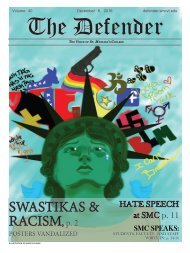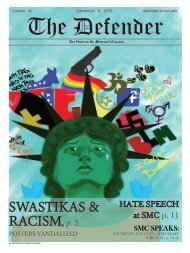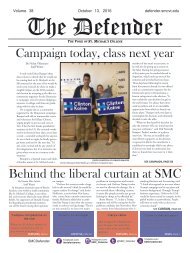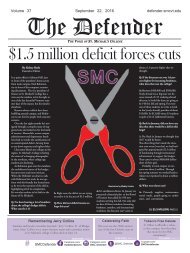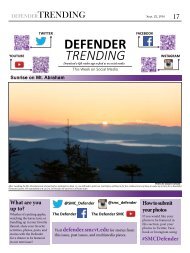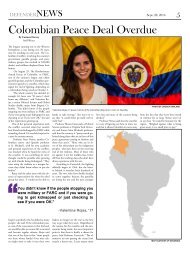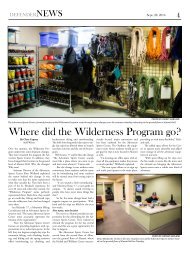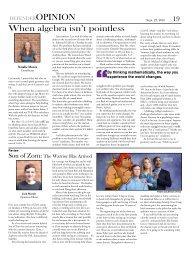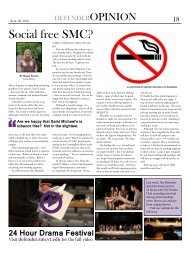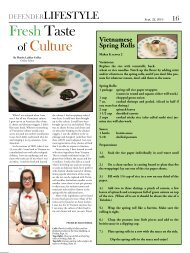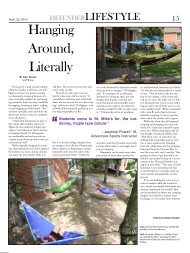FALL ISSUE 4-December 8,2016
You also want an ePaper? Increase the reach of your titles
YUMPU automatically turns print PDFs into web optimized ePapers that Google loves.
Dec.8, <strong>2016</strong><br />
defenderOPINION 16<br />
President’s office responds<br />
to campus incidents<br />
“We, the President, and Cabinet of Saint<br />
Michael’s College, affirm the following<br />
statement of the Diversity and Inclusion<br />
Council:<br />
We reject unconditionally every form<br />
of bigotry, discrimination, hateful rhetoric,<br />
and hateful action, whether directed<br />
towards one’s race, gender, gender identity,<br />
sexual orientation, religion, national<br />
origin, disability, citizenship, political<br />
views, socioeconomic status, veteran<br />
status, or immigration status.<br />
We endorse Saint Michael’s values of<br />
hospitality, diversity, and inclusion, and<br />
we support open, respectful discourse<br />
and exchange of ideas from the widest<br />
variety of intellectual, religious, class,<br />
cultural, and political perspectives.<br />
We assure every member of our community<br />
who feels targeted that no acts of<br />
hatred and bigotry will be tolerated and<br />
that any willful acts of hatred and bigotry<br />
will be addressed swiftly according to<br />
our student code of conduct.<br />
For any member of our community<br />
who may feel fear or oppression: we care<br />
about you and will do everything in our<br />
power to protect your emotional and<br />
physical safety. We pledge to work with<br />
all members of the community (students,<br />
faculty, and staff) to defend these values.”<br />
Letters to the editor: Defending the arts and the LSC<br />
By Brian D. Collier<br />
Associate Professor of Fine Arts: Art<br />
I write this letter by invitation, as part<br />
of a conversation with the SMC community.<br />
Issues raised to date are too extensive<br />
to cover completely in a short letter,<br />
but committees are proposing cuts to the<br />
Artistic Experience LSC requirement,<br />
and they involve cuts to faculty (adjunct<br />
and retiring) while undermining arts<br />
coursework across the board.<br />
Fine Arts faculty are not currently<br />
represented in the upper administration<br />
or committees proposing these changes.<br />
The proposal to eliminate the Artistic<br />
Experience requirement displays a lack of<br />
understanding of our fields and classes so<br />
here I offer a brief inside perspective on<br />
our work.<br />
Products of the arts are ever-present.<br />
Consider how much you interact with<br />
music, theater (via TV, film, or stage),<br />
dance, and visual art – everything from<br />
websites and photography to sculptural<br />
objects and designed spaces. More mysterious,<br />
it seems, are the mechanics of<br />
how artists create work – and how those<br />
skills are taught.<br />
In visual art, instruction starts with<br />
basic skills in deep observation, composition,<br />
and relationships in space and<br />
color; the translation of abstract ideas<br />
into images, objects or experiences; and<br />
collaborative and solo presentations.<br />
In other words, we teach the gradual<br />
development of artistic “language” skills,<br />
non-linear creative problem solving, and<br />
project design for individuals and teams.<br />
We teach traditional and non-traditional<br />
media, with tools ranging from<br />
charcoal and paintbrushes to woodworking<br />
tools and digital technologies.<br />
Students consider tradition as well as innovation.<br />
We use these skills to produce<br />
works defined as fine art, yet they have<br />
broad interdisciplinary and professional<br />
benefits.<br />
We teach professional skills. For every<br />
assignment, students develop creative<br />
solutions. With faculty guidance they<br />
learn how to create artwork representing<br />
physical manifestations of ideas. They<br />
improve public speaking by presenting<br />
project proposals. They analyze successes<br />
and failures in group critiques, and in<br />
that process they receive and respond to<br />
criticism.<br />
How can students learn innovation without<br />
classes focused precisely on creative<br />
problem-solving? How can we claim<br />
“critical engagement” without exploring<br />
the complex sensory landscapes of the<br />
21st century as artistic producers? How<br />
can a college succeed without the people<br />
The proposal to eliminate the Artistic Experience<br />
requirement displays a lack of<br />
understanding of our fields and classes.”<br />
and time needed for integrated reflection<br />
on those environments?<br />
The arts present a vital public face of<br />
the college in service to community with<br />
plays, concerts, and exhibitions. Student<br />
internships with area institutions serve<br />
both the community and SMC. The<br />
continuing services of our alumni to the<br />
region and beyond are vibrant, long-term<br />
outcomes of our programs.<br />
If our faculty wants to help students<br />
become more well-rounded, innovative<br />
and engaged people who serve community<br />
in vibrant and untiring ways,<br />
commitment to the arts puts these ideals<br />
into action.<br />
By Rachel Kucharski<br />
Class of 2017<br />
I did not choose Saint Michael’s College<br />
because of the LSC requirements. That<br />
was something that never crossed my<br />
mind when it came to making my decision.<br />
However, looking back on these last<br />
four years, settling on an institution that<br />
required me to step out of my comfort<br />
and often lazy zone, was, in hindsight,<br />
the best decision I could have made.<br />
I will be the first to admit that sitting<br />
through two religion classes was not the<br />
highlight of my time spent here at Saint<br />
Mike’s, but I know I am a better person<br />
for it.<br />
Coming into my freshman year at<br />
SMC, I was a declared MJD major with<br />
a clear path that I wanted to follow. It<br />
wasn’t until my required art course that I<br />
discovered a side of myself that I wanted<br />
to also pursue. A straight path that existed<br />
in the mind of a once 18 year old student<br />
recently liberated with the freedom<br />
of endless choices, is now complicated<br />
with detours as well as twists and turns.<br />
I now stand before you as a soon to be<br />
Graduated senior with a double major of<br />
MJD and Art. and wish to ask you, why<br />
fix something that is not broken?<br />
This school has always attracted a<br />
unique group of smart, and inspiring<br />
individuals that grow from the new experiences<br />
and topics that this institution<br />
supports, as well as requires. To change<br />
the curriculum would be to change what<br />
the school’s mission statement says that<br />
we stand for, “the enhancement of the<br />
human person”. This world offers so<br />
many opportunities to those willing to<br />
work for them. Working through a few<br />
unideal classes should not be considered<br />
a burden, but rather an opportunity to<br />
enhance oneself. I believe that there is a<br />
valuable lesson to be learned in each and<br />
every one of the LSC required classes. It<br />
is not only the responsibility of the student<br />
to accept the challenge of finding it,<br />
but rather the administration’s to encourage<br />
this quest for higher education.<br />
To me, being a well rounded individual<br />
represents a successful education. Having<br />
these diverse experiences are much more<br />
important than going through life with<br />
blinders up. Let’s keep our paths interesting,<br />
it’s more fun this way.<br />
Why fix something that is not broken?”<br />
Write a letter<br />
to the editor:<br />
Letters should 250 words, include<br />
writer’s full name and<br />
phone number. Anonymous<br />
letters will not be considered<br />
for publication. Letters should<br />
be responses to articles featured<br />
in the previous issue or introducing<br />
a new topic. Letters<br />
may be edited by The Defender<br />
staff for spacing and publishing<br />
restrictions, clarity and grammar,<br />
spelling, punctuation. The<br />
opinions expressed in each letter<br />
are the writer’s own. While<br />
all letters submitted to the editor<br />
will be considered, not<br />
all will be published. This is a<br />
choice made by The Defender<br />
staff collectively.<br />
Please submit letters to the editor<br />
to kbode@mail.smcvt.edu.



